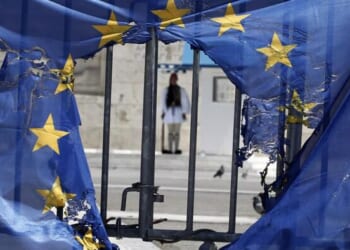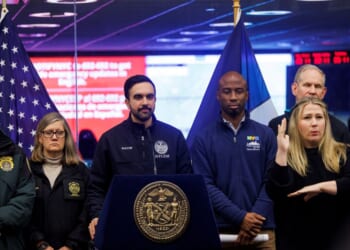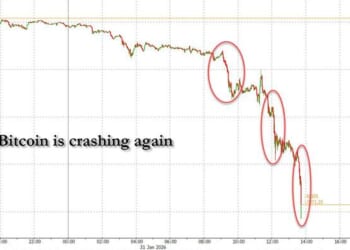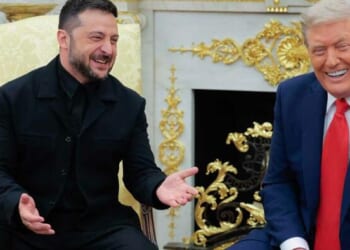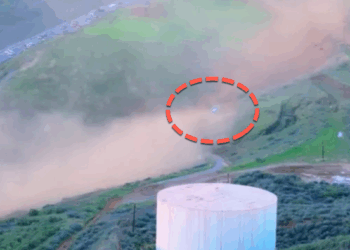
Government officials tend to dislike it when their employees disclose information to journalists that casts their department in a negative light. But Secretary of Defense Pete Hegseth is taking the Cabinet secretary’s natural dislike for press leaks to another level.
Last month, Hegseth announced that, going forward, journalists covering the Pentagon will have to sign a pledge to refrain from gathering or publishing information not authorized by the Department of War (the Trump administration’s new moniker for the Department of Defense). “DoW remains committed to transparency to promote accountability and public trust,” the order says. “However, DoW information must be approved for public release by an appropriate authorizing official before it is released, even if it is unclassified.” Journalists who refuse to abide by this directive could not only lose their press credentials but also be deemed “a security or safety risk.” (On Monday, under vocal pressure from the Pentagon press corps, Hegseth walked back the measure).
By attempting to prevent journalists from reporting on the inner workings of America’s largest employer and sharing that information with the public, this measure would have essentially prohibited journalism. It was a bullying attempt to turn independent journalists into sycophantic publicity agents. And while the Trump administration ultimately decided not to go forward with the draconian policy, the mere fact that it tried demonstrates how the Espionage Act of 1917—a law criminalizing the dissemination of national defense information—is particularly susceptible to exploitation by a government seeking to silence media critics.
“By failing to distinguish between leakers and recipients, the law has a chilling effect on the practice of journalism.”
James Kirchick
“When lives are on the line, there must be a deterrent to discourage journalists from behaving toward government secrets with extreme recklessness.”
Gabriel Schoenfeld
Given Hegseth’s record at the Pentagon since his controversial confirmation earlier this year, it’s entirely understandable that he wants to silence an adversarial press. Less than two months into his tenure, Hegseth took part in a group chat on the messaging service Signal with other Trump administration national security officials to which Atlantic editor in chief Jeffrey Goldberg had been mistakenly invited. Among other classified information, Hegseth shared the launch times of fighter jet aircraft, drones, and missiles taking part in an American attack on Houthi rebels in Yemen. Rather than apologize for this massive lapse in security, Hegseth lashed out at the journalist who reported it, calling Goldberg “deceitful” and a “discredited so-called journalist.”
Less than two weeks later, the Wall Street Journal reported that Hegseth’s wife, a former Fox News producer, accompanied him to meetings with foreign diplomatic and military leaders where sensitive information was discussed. The following month, the Journal reported that top Pentagon officials were preparing a briefing on China for Elon Musk despite Hegseth’s having publicly said otherwise. By June, with Hegseth spending an inordinate amount of his time trying to prevent the sort of leaks that have marred his leadership, the White House ordered him to stop administering random polygraphs to senior officials after one of his own advisers complained.
The coverage of Pete Hegseth’s Pentagon is a model of what the free press is supposed to do: expose abuses of power. In the case of Hegseth, that mainly takes the form of incompetence and buffoonery. An independent media is the only thing standing between a free society and dictatorship, and it’s a sign of the media’s effectiveness that Hegseth resorted to such low tactics to shut it down.
While the American media remains able to report freely on the Trump administration, the government has a weapon in its arsenal that could theoretically put an end to it: the Espionage Act.
Passed in the heat of World War I, the Espionage Act set out to address an entirely legitimate concern: protecting national security secrets from our enemies. But in addition to criminalizing the theft and disclosure of said secrets by spies, the act penalized anyone who “lawfully or unlawfully having possession of, access to, control over, or being entrusted with any document, writing, code book, signal book, sketch, photograph, photographic negative, blue print, plan, map, model, instrument, appliance, or note relating to the national defense, willfully communicates or transmits or attempts to communicate or transmit the same and fails to deliver it on demand to the officer or employee of the United States entitled to receive it.”
Along with its criminalization of anyone who “induces or aids another” in the above activities, the Espionage Act effectively makes reporting on national security affairs illegal. It should be amended to distinguish between the leaker, who agrees to protect classified information as a condition of their employment, and the journalist, who has no such responsibility.
In an influential 1973 law review article published in the aftermath of the Pentagon Papers case, legal scholars Harold Edgar and Benno Schmidt Jr. wrote that the act was “a loaded gun pointed at newspapers and reporters who publish foreign policy and defense secrets.” Recognizing the threat that the law poses to the First Amendment, the U.S. government declined to invoke the act against journalists for just over a century. This record of abeyance was broken in 2019 when the Trump Justice Department indicted WikiLeaks founder Julian Assange on 17 Espionage Act violations. Assange, the government alleged, violated the statute when he published a trove of State Department cables leaked to him by former Army intelligence officer Chelsea Manning.
Though I’ve written extensively about the damage that the virulently anti-Western Assange has done, I was pleased when the Biden Justice Department reached a deal with Assange allowing him to plead guilty to a single charge of “conspiring with Chelsea Manning … to unlawfully obtain and disclose classified documents relating to the national defense.” Assange might not look like a traditional journalist, and his views might be execrable. But there’s no legal distinction between his publishing leaked information on his website and what major media outlets do on a daily basis. As the Supreme Court justice Byron White wrote in a 1973 decision, the “liberty of the press is the right of the lonely pamphleteer who uses carbon paper or a mimeograph just as much as of the large metropolitan publisher who utilizes the latest photocomposition methods.” This broad definition of who counts as a journalist is especially important in this new media era as a once-hegemonic legacy press gives way to a landscape in which many alternative voices are vying for our attention. The government should not be in the business of who counts as a “legitimate” journalist.
That the government has only once indicted someone who could conceivably be called a journalist under the Espionage Act does not mean that it doesn’t need reform. By failing to distinguish between leakers and recipients, the law has a chilling effect on the practice of journalism. (Of course, if a purported “journalist” is working on behalf of a foreign government, then they should be prosecuted under applicable laws.)
One thing the Espionage Act cannot, and frankly should not, do is attempt a legal distinction between the terms “leaker” and “whistleblower.” Their appellation is entirely subjective, a function of how one views the information that was disclosed, the manner in which it was released, and to whom it was given. Many people (mostly on the left and libertarian right) view Chelsea Manning as a heroic whistleblower who exposed the seedy underbelly of the American empire. Many similarly consider Edward Snowden, who collaborated with both establishment and independent journalists in the release of the National Security Agency files he pilfered, a courageous truth-teller. I find these assessments lacking, not only because I don’t share the anarcho-leftist sensibilities of the leakers but also due to the process by which they leaked. A genuine whistleblower wants to help their country, not humiliate it. If they possess evidence of wrongdoing, they should first approach someone equipped to deal with whistleblowers (an inspector general, the congressional and Senate intelligence committees, etc.) before handing over classified information to a dubious character like Julian Assange or seeking shelter in Vladimir Putin’s Russia.
A silver lining to the Trump administration’s multifarious abuses of power is that it offers a daily lesson in the importance of limited government, checks and balances, and the Constitution. National security conservatives inclined to take a hard position against leakers ought to consider the unchecked power that the Espionage Act gives the government, and how easily that power can be abused in the hands of reckless and irresponsible people.













